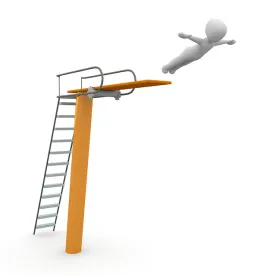Diving into a pool or lake during summer activities may land you in a wheelchair for the rest of your life; over 800 people per year suffer a spinal cord injury from diving in head first. These injuries are preventable—just remember to always go in feet first when entering pools, ponds, lakes, and the ocean.
Perhaps you didn’t see a sign warning you of danger. Maybe you didn’t know that the “No Diving” sign meant the water was too shallow. Or you thought the water was deep enough because it had been the last time you dove in. But 1000 other people thought that too and ended up with broken necks, paralysis, or even worse, didn’t make it through the injury.
Alarming facts from the Foundation for Aquatic Injury Prevention
-
“Very few people know they can break their neck or get a spinal cord injury from diving into water five feet or less.”
-
Estimates show the speed of a dive is about 15 feet per second. If the water is only 5’ deep you could be paralyzed in 1/3 of a second.
-
Some health agencies recommend that water be at least 9 feet deep for forward diving.
-
-
“Very few recreational swimmers consider a depth of five feet shallow water.”
-
What do you think is shallow? Would it surprise you to know many people assess shallow water at 18 inches to 3 feet?
-
-
Even if you have never been seriously injured diving into shallow water, next time you could break your neck, even in the same pool.
Of the 800 spinal cord cases per year caused from diving 90% result in paralysis (American Academy of Neurology). Watch these videos to hear first-hand from young people who were paralyzed while diving headfirst into pools and ponds:
-
Caleb Rimes, quadriplegic after he dove into a pond when goofing around with his friends.
-
Cole Snyder paralyzed from the chest down. Started the No What UR Divin’ N2 campaign.
-
Lauren Shevchek paralyzed from shoulders down after diving in a pool during swimming practice.
-
Jake Javier paralyzed after he dove into his pool from the ledge of the attached hot tub.
Tips for Diving Safety
-
Feet First – Always
-
You can’t tell the depth of water by looking at it. Don’t depend on your vision.
-
Shifting sand and sediment can change the bottom depth—don’t depend on your past experience.
-
Don’t dive into the shallow end of pools—even experienced swimmers should avoid this.
-
Don’t run and dive—it increases speed and takes away control of the dive.
-
If you dive in, steer up to avoid hitting the bottom.
-
Remember that in 1/3rd of a second you could be paralyzed.
If you are with someone you suspect has suffered a spinal cord injury, don’t move them. They need to be immobilized for best results. Seek immediate medical care.



 />i
/>i
